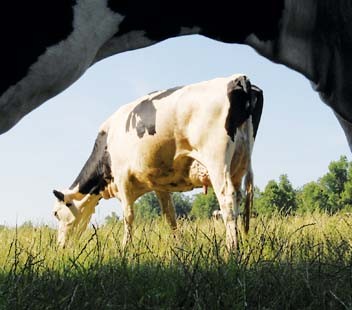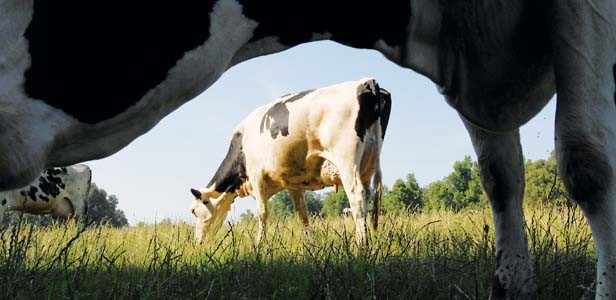Carlinville-based dairy producer Prairie Farms will no longer supply milk under Wal-Mart’s Great Value brand, but Prairie Farms chief executive officer Ed Mullins says the company will certainly survive, even if it has to make a few cuts.
Prairie Farms has provided dairy products to Wal-Mart for more than 20 years, Mullins says, and Wal-Mart sold some Prairie Farms milk under its own Great Value label, along with normal Prairie Farms-branded products. But Wal-Mart has now decided to purchase milk sold locally under the Great Value label from a company in Texas, effectively reducing its business with Prairie Farms.
“We have an at-will business arrangement with Wal-Mart,” Mullins said, explaining that there was no contract between the companies. “It is a loss, and nobody likes losing any business, but it’s a small bump in the road, and we’ll recover.”
Though he declined to divulge how much milk Prairie Farms provided under both labels, Mullins did say that Wal-Mart remains his company’s largest customer.
“We did lose some volume from them, but we are also maintaining a significant volume with them, and we’ll try to make up the lost volume through other retailers,” he says. Prairie Farms also provides dairy products sold under Walgreens’ house brand, according to Mullins.
Prairie Farms maintains 20 production plants in Illinois, including two facilities in Springfield and others in Carlinville, Decatur and Peoria. Mullins said there is a possibility that the company might have to lay off workers to cut costs due to the lost volume, but it’s too early to tell how many workers would lose jobs, where jobs might be cut, or even whether that is a certainty. Mullins said Prairie Farms might even have to close a plant.
“That is a possibility, but we don’t know where,” Mullins says. “It’s a complex decision that has to do with raw milk production costs, future growth, expansion potential, population growth – it’s a decision that would not be taken lightly.”
The decision by Wal-Mart was apparently based on supply costs, according to Ashley Hardie, spokeswoman for Wal-Mart.
“We review our portfolio on an ongoing basis as we strive to save our customers money on the products they want and need,” Hardie says. “Prairie Farms continues to be a valued supplier and will have their products in a significant number of our stores.”
In November, Wal-Mart announced it was the largest purchaser of locally-grown produce in the country, estimating that more than 70 percent of its produce is locally grown. (See “Is Wal-Mart the new local?” Nov. 12, 2009.)
“Buying local has always been a part of Wal-Mart, and Wal-Mart has been buying local ever since its founding,” said Zelina Bazan, local sourcing buyer for Wal-Mart, at a Nov. 10, 2009 press conference inside the new Wal-Mart on South Sixth Street in Springfield.
Both Wal-Mart and the Illinois Department of Agriculture define “local” as produced within the state, but Wal-Mart’s switch to a Texas-based company will likely mean locally-sold Great Value milk will no longer be locally-produced.
Hardie declined to comment on whether shifting suppliers conflicted with its local-buying initiative.
Despite the reduced business with Wal-Mart, Mullins is optimistic about his company’s future.
“We’re continuing to grow,” he says. “We’re expanding market share, picking up volume with other customers. We have a new redesigned carton, a new ad program and sales are growing. The outlook is bright.”
Contact Patrick Yeagle at [email protected].





















